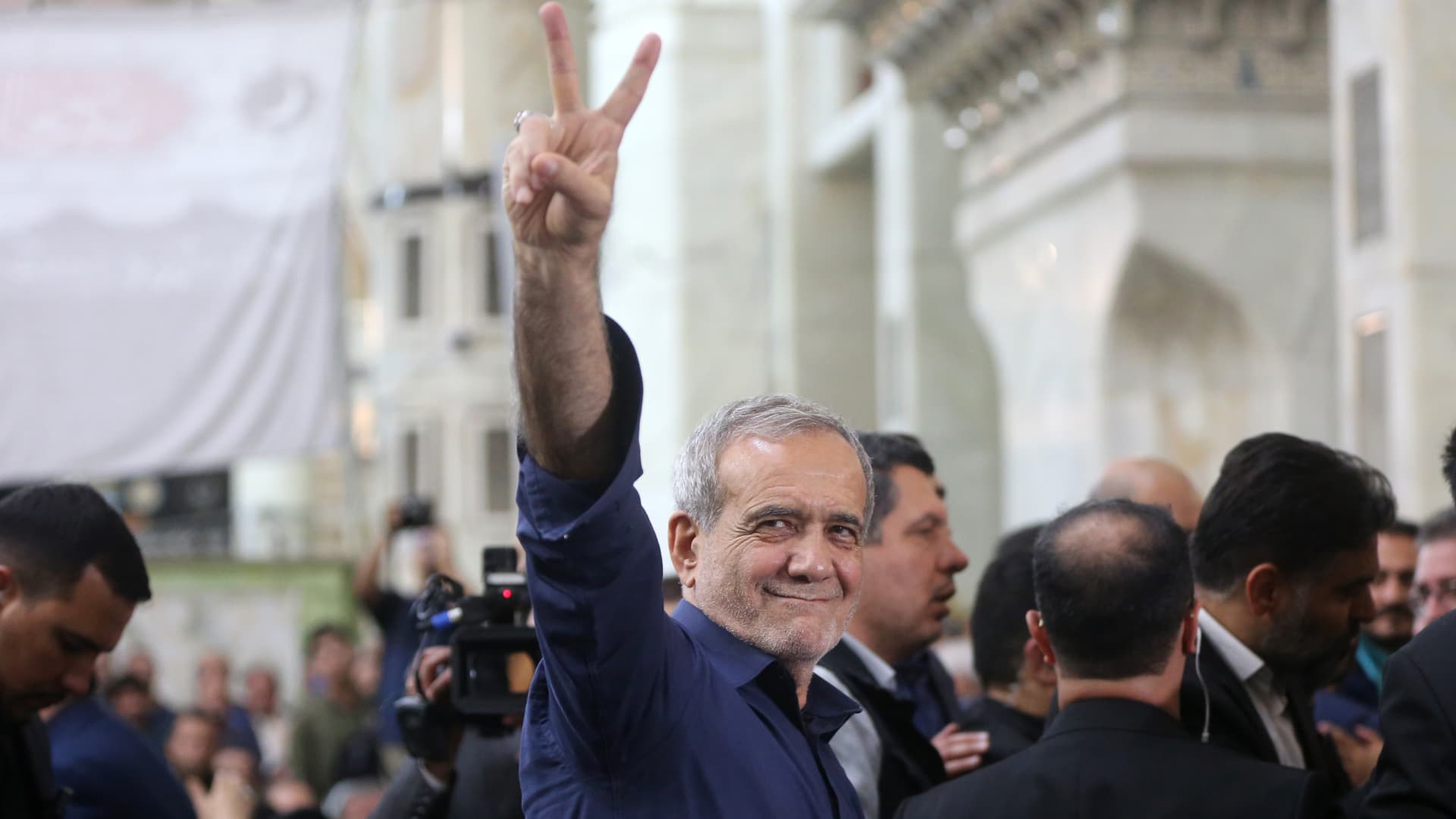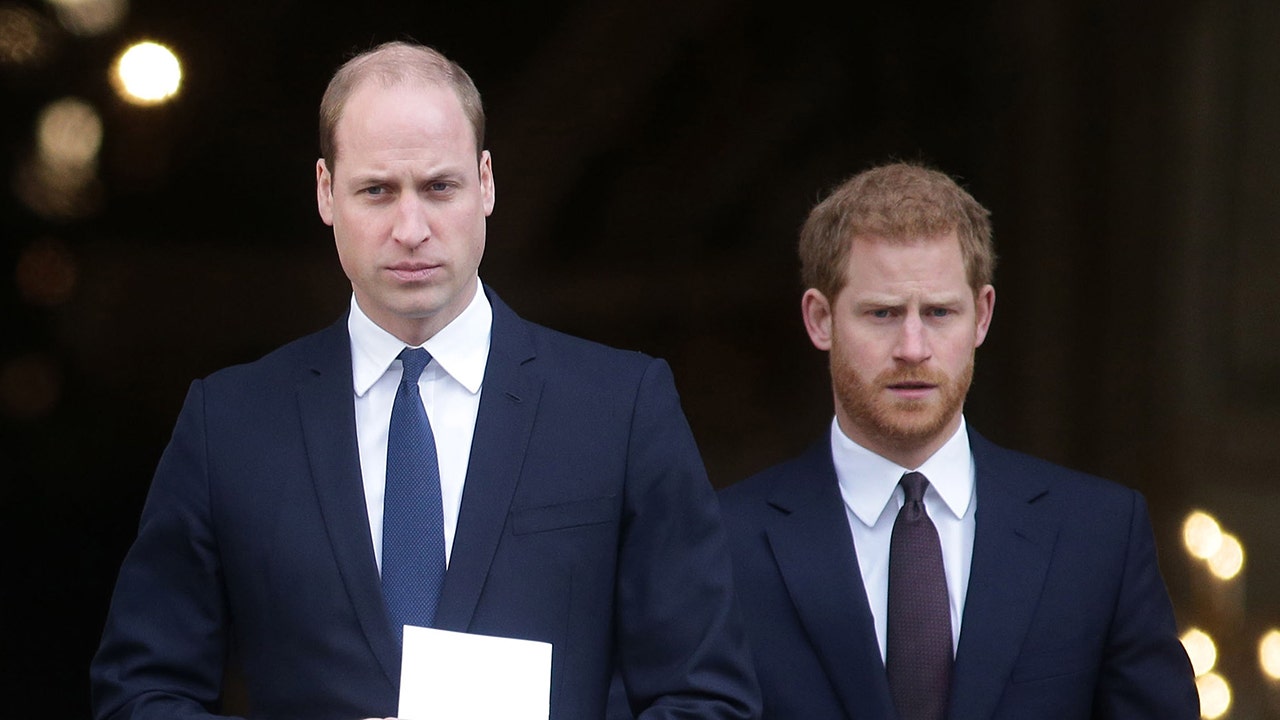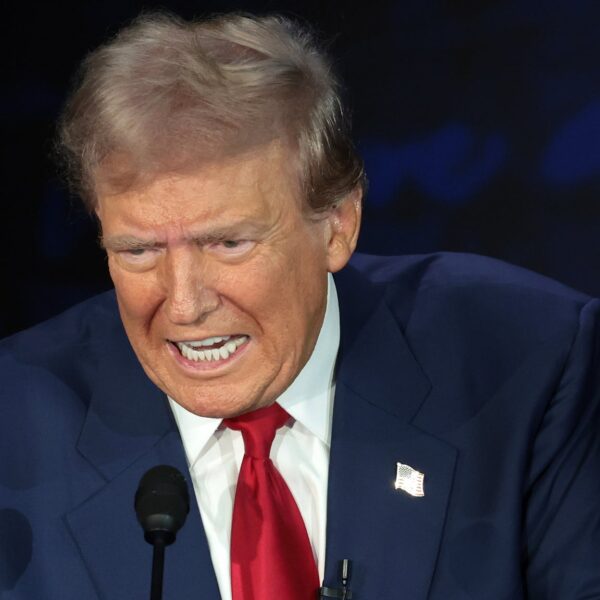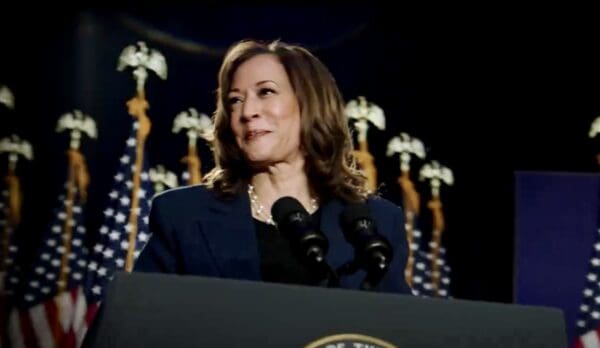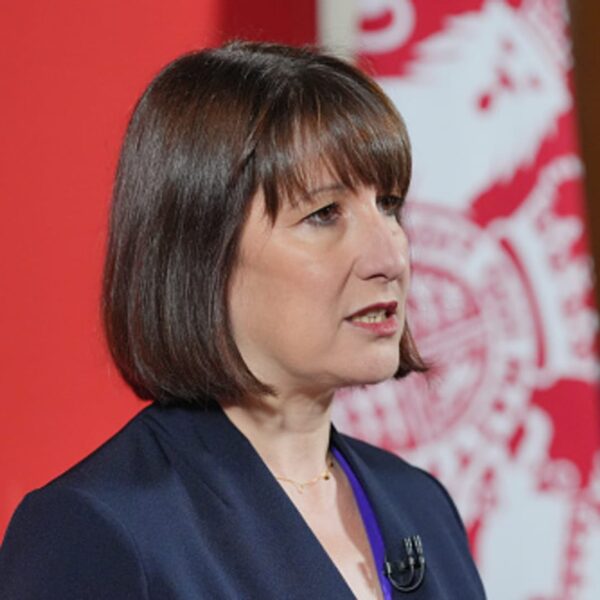Newly-elected Iranian President Masoud Pezeshkian visits to the shrine of the Islamic Republic’s founder Ayatollah Ruhollah Khomeini in Tehran, Iran on July 06, 2024.
Fatemeh Bahrami | Anadolu | Getty Images
Iran on Friday elected its first “reformist” president in 20 years, signaling many voters’ rejection of hardline conservative policies amid low turnout of just 49%, according to official figures.
Masoud Pezeshkian, a former health minister and member of parliament, was the most moderate of the candidates vying for the presidency after the sudden death of former President Ibrahim Raisi in a helicopter crash in May.
Described as a “token reformist” and “second-tier candidate” by many analysts, the 69-year-old Pezeshkian was seen as having scant chance at the presidency as he lacked name recognition and was up against a highly conservative system.
“The whole election process leading to Pezeshkian’s victory now has indeed been surprising. It does mark a notable shift in Iran’s political landscape,” Sina Toossi, a senior non-resident fellow at the Center for International Policy, told CNBC.
The result, Toossi said, “reflects a complex interplay of voter discontent, abstention, and a desire for change. Despite the heavily controlled and undemocratic nature of the election process, Pezeshkian’s success signals a rejection of hardline extremism and an appetite for reform and better relations with the global community.”
Supporters attend a campaign rally for reformist candidate Massoud Pezeshkian at Afrasiabi Stadium in Tehran on June 23, 2024 ahead of the upcoming Iranian presidential election.
Majid Saeedi | Getty Images News | Getty Images
His victory at the polls was all the more surprising given the fact that Iran’s ultra-conservative Guardian Council decides who is allowed to run for election in the first place, heavily favoring conservative candidates.
Still, Pezeshkian “faces substantial challenges from entrenched hardliners and external pressures, making his presidency a critical and uncertain chapter for Iran’s future,” Toossi said.
How much can change, really?
Pezeshkian, a former heart surgeon who served as minister of health under the 1997-2005 mandate of Iran’s last reformist president Mohammad Khatami, said he wants to loosen social restrictions like Iran’s strict hijab law and improve relations with the West, including potentially restarting nuclear talks with world powers.
But “reformist” is a relative term in Iran, as Pezeshkian still voices his support for the supreme leader Ayatollah Ali Khamenei and has expressed no intention to challenge the theocratic system of the Islamic Republic.
Pezeshkian “is a reformist who has many times over the last few weeks come out and said that Khamenei’s way, or direction, is the way, and he fully intends to follow that path,” said Nader Itayim, Mideast Gulf editor at Argus Media.
“He’s not a reformist who is going to try to come in and shake things up. In that sense he’s a low-risk option” for Khamenei and may have been seen by religious authorities as “manageable,” Itayim said.
Vehicles move past a billboard displaying the faces of the six presidential candidates (L-R) Mohammad Bagher Ghalibaf, Amirhossein Ghazizadeh-Hashemi Alireza Zakani, Saeed Jalili, Mostafa Pourmohammadi and Masoud Pezeshkianin in the Iranian capital Tehran on June 29, 2024. Iran’s sole reformist candidate Masoud Pezeshkian and ultraconservative Saeed Jalili are set to go to runoffs after securing the highest number of votes in Iran’s presidential election, the interior ministry said.
Atta Kenare | Afp | Getty Images
For Behnam Ben Taleblu, a senior fellow at the Foundation for Defense of Democracies at the Washington-based think tank Foundation for Defense of Democracies, the election of Pezeshkian is nothing more than a cosmetic change.
“Pezeshkhian offers the regime the chance to once again offer stylistic changes in exchange for substantive concessions from the West,” Ben Taleblu said.
“Faced with mounting domestic and international challenges, particularly after the 2022-2023 ‘Women, Life, Freedom’ nationwide uprising against the regime, Tehran is trying to again tempt the West with the same fiction of moderation.”
Months of protests for women’s rights and the downfall of the Iranian regime rocked Iran and its hardline government following the death of a young Kurdish Iranian woman named Mahsa Amini in September 2022. Amini died in police custody after being arrested for allegedly improperly wearing her headscarf, which women in Iran are required to wear.
The protests led to severe crackdowns and frequent internet blackouts by Iranian authorities, as well as thousands of arrests and several executions.
A protester holds a portrait of Mahsa Amini during a demonstration in support of Amini, a young Iranian woman who died after being arrested in Tehran by the Islamic Republic’s morality police, on Istiklal avenue in Istanbul on Sept. 20, 2022.
Ozan Kose | AFP | Getty Images
But despite Pezeshkian’s stated support for relaxing things like headscarf penalties, Iran-focused human rights groups are not optimistic.
“Anyone pledging loyalty to the [Iranian] constitution, a ‘reformist,’ a ‘moderate,’ a ‘conservative,’ … is ultimately a hardliner by democratic standards,” the Washington-based Abdorrahman Boroumand Center for Human Rights in Iran wrote in a report Friday. “This is why many Iranians have lost hope in bringing about change through the ballot boxes and are boycotting elections.”
“The choice of the president may lead to minor shifts but, even in the best case scenario, it will fail to bring significant change to Iran,” the report read. “The core structure of Iran’s theocratic regime, where a Supreme Leader’s authority eclipses that of any president, will remain steadfastly intact… In essence, Iran’s theocracy is designed to resist meaningful change.”
What if Trump wins?
Turning to foreign policy, analysts predict no change in the support and funding for regional proxy groups like Hezbollah in Lebanon, Hamas in the Gaza Strip and the Houthi rebels in Yemen — something that the Iranian president himself has little power over anyway.
Pezeshkian wants to focus on sanctions relief for Iran and its battered economy and has talked about repairing some relations with the West, particularly on the issue the Iranian nuclear deal, which lifted harsh economic sanctions in exchange for curbs on the country’s nuclear program.
Iran is now closer than ever to bomb-making capability, according to the International Atomic Energy Agency — and at the same time, former President Donald Trump, who introduced a strict set of sanctions against Tehran during his previous term, may return to the White House in November. If Trump takes office and maintains his previously staunch position of piling sanctions on Iran and abandoning the nuclear deal, then Pezeshkian’s goals are essentially futile.
The Iranian election result presents a “potential to open up to the West, but comes at precisely the wrong time given we are at the [potential] end of the Biden presidency, and likely a Trump presidency and the GOP hawks will have zero interest of engagement with Iran,” Tim Ash, senior emerging markets strategist at RBC BlueBay Asset Management, said in an email note.
“Notable I think that Iran, like the Gulf states, would want to concentrate on the economy as a drive to alleviate political pressure,” he added, “but seems unlikely that given the U.S. political cycle, and events in Gaza, there will be any desire to open up to ‘reformers’ in Iran.”

